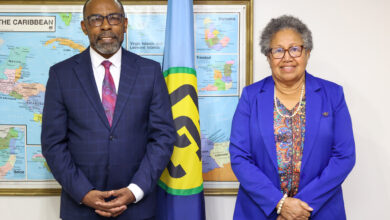Ladies and Gentlemen: It is a great pleasure to be with you this morning for the signing of this financing agreement between CARIFORUM and the European Commission. It is some time since I have been able to sign a Regional financing agreement but I hope soon to be able to sign more since there are several other projects in the pipeline.
Our Regional Cooperation under the 9th European Development Fund Caribbean Programme aims primarily at intensifying Regional Integration through economic repositioning. In recognition of this need, the Commission is supporting a variety of projects in the Region, such as the present one, the Caribbean Knowledge and Learning Centre (CKLN), which aims to develop regional educational levels and so competitiveness.
Over the last 30 years, the European Commission has been one of the largest donors towards the African Caribbean and Pacific (ACP) countries, providing over €50 billion under the European Development Fund, (the EDF), resources alone. Current 9 EDF resources were allocated under the ACP-EC Partnership Agreement, signed in Cotonou, Benin, in June 2000.
The Cotonou Agreement, as it is thus called, has made available a package of €57M specifically for Regional Cooperation in the Caribbean for the period 2002-2007. Added to these are some 300 million Euros going to Regional projects from the EDF and from the Commission’s budget lines, for support to the banana, rum and rice industries, for HIV/AIDS etc. In addition, the Commission has allocated over €450M to supporting individual countries’ programmes in this Region.
The Caribbean, like many other regions, has to educate and to keep its human resource base, as well as to attract trained nationals back, if it is to develop economically and to have a trained, competitive labour force. It needs this to enable it to face the challenges of the 21st century and to be able to react to the dynamics of the global knowledge economy. The CKLN, for which we are hereby granting €2M, is in this context an extremely important Institution.
The CKLN is a network which aims at supporting and facilitating the work of tertiary education systems in nine (9) Caribbean countries. It (and other similar initiatives) can and must play an important role in keeping the Region’s economies viable. The CKLN offers further education opportunities to adults who work fulltime, women at home in charge of their families, and to all the populations of small island states, where the people have little or no access to tertiary education facilities. The CKLN will enable them to study electronically and to obtain qualifications from their homes. The CKLN project will also contribute to upgrading and diversifying existing skills and knowledge of the Caribbean people.
It will improve the technical environment and the ability of Tertiary Education Institutions to deliver cost-efficient and effective ICT-based training through supporting technical assistance and workshops. It will support Ministries of Education and Planning through providing technical support in the field of distance learning.
The project will work with the University of the West Indies and will provide services to enable low cost distance learning to be extended to an additional twenty tertiary education institutions across the Caribbean. This will bring the total number involved to some 50 institutions by the end of the project.
Another important result will be the mainstreaming of low cost broadband connections to participating Tertiary Education Institutions – something essential if electronic learning is to be successful. The project will also provide support for helping the CKLN to operate on business principles.
The CKLN programme will be implemented through an agreement signed between the European Commission and the World Bank, which has been heavily involved in this network from the beginning. Various other donors and Caribbean Governments have also provided support to the larger programme. This overall support will amount to some USD $9M. The intention is, in the future where appropriate, to link up with Latin American and European distance learning programmes.
In this context, I would like to take this opportunity to urge Governments, other regional education bodies and the private sector to take an active role in supporting this project and bringing it to the attention of interested persons.
Knowledge is power, so let us energise this process!
Thank you.




